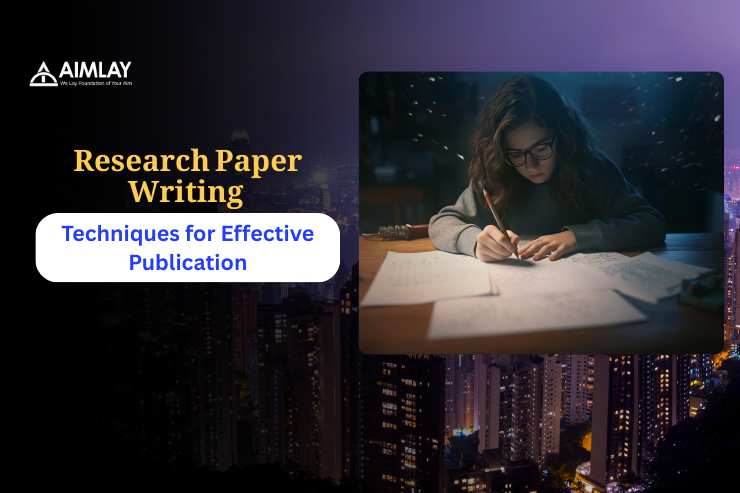How competitive is the PhD admission process in 2024?
- aimlay01
- Oct 28, 2024
- 5 min read

The PhD admission in 2024 is increasingly competitive, as aspiring scholars face higher standards for acceptance. With more students pursuing advanced research across various fields, admission boards worldwide are becoming selective, prioritizing candidates who demonstrate strong academic backgrounds, research potential, and a clear alignment with the program’s resources and faculty expertise. Here’s a detailed look into the key factors influencing this competitive landscape and strategies to help candidates stand out.
1. Increased Applicant Pool
The number of applicants for PhD programs has surged in recent years, fueled by an emphasis on higher education, career advancement, and the desire for specialization. Not only are domestic applicants increasing, but there is also a significant rise in international students seeking opportunities abroad.
In fields like technology, engineering, psychology, and data science, competition has especially intensified as these areas have seen a rapid evolution, creating both demand and interest in specialized knowledge.
2. Stringent Admission Requirements
Many universities have refined their admission criteria, focusing on applicants with prior research experience, high academic performance, and relevant coursework. For instance, STEM and business fields often require a solid foundation in quantitative skills, demonstrated through prior research projects or publications.
Some institutions are now looking beyond academic transcripts, seeking evidence of practical experience, problem-solving abilities, and resilience. Strong recommendation letters and a well-articulated statement of purpose are critical, with admissions committees scrutinizing candidates' motivations and alignment with the institution’s research objectives.
3. Focus on Research Alignment
Candidates whose research interests align with the faculty's work have a stronger chance of acceptance. Universities are keen to admit students who can contribute directly to existing projects or add value to the institution's research initiatives.
This alignment is particularly relevant in fields with funding constraints, where universities prioritize projects that align with available grants or institutional priorities. Students are advised to thoroughly research faculty members’ work, demonstrating an understanding of the department's focus and goals.
4. Funding Constraints
Financial limitations play a substantial role in PhD admissions. Universities often prioritize candidates they can support through scholarships, grants, or assistantships, especially in fields with limited funding opportunities. In highly competitive programs, financial aid and assistantship positions are awarded based on academic merit and research potential.
Programs with substantial funding tend to attract more applicants, which further elevates the competition. Candidates are expected to demonstrate both a strong research proposal and a realistic funding plan, especially for self-funded programs or fields where external grants are scarce.
5. Impact of Standardized Tests
While some institutions are phasing out standardized tests like the GRE, many still use these scores as part of the admissions process. A strong test score can be an advantage, particularly in competitive fields where academic rigor is emphasized.
In some countries, standardized tests remain essential for evaluating a candidate's foundational knowledge and critical thinking abilities. As a result, candidates with high GRE, TOEFL, or IELTS scores often have an edge over others in competitive programs.
6. Emphasis on Research Experience and Publications
Applicants with prior research experience, publications, or conference presentations are seen as better prepared for the demands of a PhD program. This trend is particularly evident in research-intensive programs, where prior experience demonstrates a candidate’s ability to contribute meaningfully to the institution's academic output.
Research experience, especially in top-tier journals, indicates a candidate's understanding of the research process, critical thinking skills, and commitment to advancing knowledge in their field.
7. Soft Skills and Interdisciplinary Knowledge
Admission committees increasingly value candidates with soft skills such as communication, teamwork, and adaptability, especially for PhD programs involving collaborative research projects. Effective communication and teamwork are essential for candidates to thrive in multidisciplinary teams, which are becoming more common in research environments.
Furthermore, candidates with interdisciplinary knowledge stand out, particularly in fields like environmental science, bioinformatics, and artificial intelligence. Demonstrating skills across related disciplines, such as data analysis or technical writing, can make candidates more attractive to programs emphasizing cross-functional expertise.
8. Geopolitical Factors and Immigration Policies
For international applicants, admission competitiveness can vary significantly depending on the immigration policies of their desired country. Countries with stringent visa requirements or limited post-graduation work opportunities may see a decline in applications, whereas others with more favorable policies attract a larger applicant pool.
For example, Canada, Germany, and Australia have seen an increase in applications from international students due to their supportive post-study work policies. In contrast, changing immigration policies in the U.S. and U.K. have impacted applicant trends and can influence where students choose to apply.
9. Institutional Reputation and Rankings
Highly ranked institutions naturally draw a larger pool of applicants, making the admission process more competitive. Reputation plays a significant role, as students often aim for institutions that offer better resources, renowned faculty, and higher employability rates post-graduation.
Admission into Ivy League universities, globally ranked research institutions, or top-tier public universities is particularly competitive. Applicants targeting these institutions should be prepared to demonstrate exceptional academic achievements, research contributions, and a unique value proposition.
10. Digital Transformation and Use of AI in Screening
In 2024, many institutions have started utilizing AI tools to assist with the admissions process, allowing for more in-depth and efficient evaluations. These tools can quickly assess a candidate’s background, research potential, and even fit with the program’s culture.
AI-driven screening systems also evaluate factors like diversity and inclusivity, ensuring a well-rounded cohort. Applicants should be aware that automated systems often look for specific keywords and accomplishments, making it essential to craft applications that meet these technical requirements.
11. Diversity and Inclusivity Initiatives
Many institutions are focused on increasing diversity within their PhD programs, seeking candidates from varied backgrounds and perspectives. Some schools have dedicated quotas or funding specifically aimed at underrepresented groups, creating both opportunities and increased competition for these slots.
Candidates from diverse backgrounds who can bring unique insights to their research field are highly valued. Emphasizing how one’s background contributes to their academic perspective and research interests can be a powerful addition to an application.
12. Preparation Tips for Applicants
Develop a Strong Research Proposal: Craft a proposal that highlights originality and clear objectives. Tailor your research plan to align with potential advisors’ work, demonstrating how your research will contribute to the department’s mission.
Gain Research Experience: Participate in research projects, internships, or publish in relevant journals. Experience in a research setting shows commitment and provides hands-on skills valuable to any PhD program.
Network with Faculty Members: Reach out to potential advisors or attend departmental events, webinars, and academic conferences to understand the department's focus and make a strong case for why you’d be an asset to the program.
Prepare for Interviews and Presentations: Some programs require interviews or presentations. Be prepared to discuss your research experience, your interest in the program, and how you plan to contribute to the academic community.
Focus on Personal Statement: Craft a compelling narrative that not only details your academic achievements but also illustrates your passion for the field and how your research aligns with the program’s goals.
Conclusion
The PhD admission process in 2024 is undoubtedly competitive, driven by an increase in applicants, the emphasis on research experience, and the role of financial and geopolitical factors. Prospective candidates should invest time in crafting thorough, well-researched applications that highlight their academic abilities, research alignment, and unique perspectives. By addressing both technical and interpersonal expectations, applicants can strengthen their chances of standing out in this challenging but rewarding process.








Comments